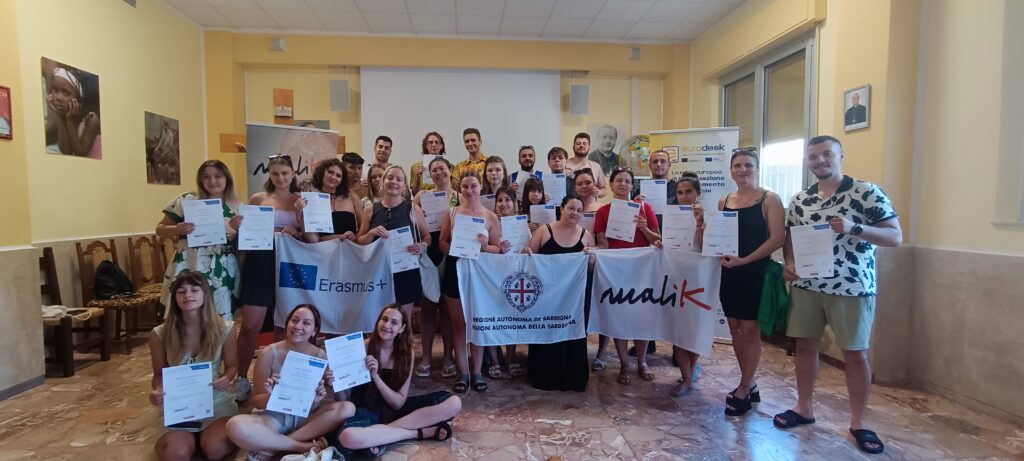The youth exchange “Re-population” took place from July 8 to July 15.
For one week, from July 8 to July 15, 2024, at the Xaverian Missionary Institute on Via Sulcis in Cagliari, 30 young people from Sardinia and Europe (from Bulgaria, Lithuania, Romania, and Serbia) met for the youth exchange “Re-population,” organized by the association Malik E.T.S., and funded by the European Erasmus Plus program and the Autonomous Region of Sardinia, Department of Education, Cultural Heritage, Information, Entertainment, and Sports.
The specific goal of the project was to raise awareness among young people and families in the involved countries about the phenomenon of depopulation in rural areas and the need to counteract it. According to a 2021 Eurostat statistic, from 2015 to 2020, in predominantly rural areas, the number of people aged 65 and over increased by 1.6–1.8% each year, with the fastest growth recorded. Conversely, the number of people of working age decreased, on average, by 0.6% each year, and the number of young people by a slightly larger margin (-0.7% each year).
During this week of discussions, our participants, divided into international groups, worked to propose entrepreneurial ideas capable of finding creative solutions to the problem of depopulation in rural areas. To do this, they conducted a careful and thoughtful SWOT analysis of the contexts, engaged in various brainstorming sessions, and each group presented the best practices of their nation. The work was inspired by the selection criteria of the Call for ideas launched by the Giulini Foundation, Fluorsid SPA, and Lavoro Insieme Srl social enterprise, open until September 30, which provides funding for young people and entrepreneurs from Gerrei, Sarrabus, and Trexenta to develop their ideal startup. Through creativity and innovation, this initiative aims to give young people and entrepreneurs in rural areas the opportunity to become leaders in their territories.
Each group had the opportunity to present their work through a speech to two rural area experts: Dr. Maria Giuseppina Cireddu, a local development expert from RAS, and Dr. Claudia Sedda, director of GAL BGM and Marghine, whom we thank for their valuable advice. By creating a storyboard, the groups explained their project ideas and the entire process that led them to identify the name, create the logo, determine the target audience, and assess the impact on the territory in ten minutes. Among the ideas were a startup for recycling textiles from fast fashion and an agri-food startup that allows the sharing of recipes from rural areas of Europe.
The group was also hosted by rural businesses that embody the spirit of our project. We visited San Nicolò Gerrei in the Gerrei region to meet two local excellences that won the Call for Ideas last year and are now part of the Terre ritrovate project. This initiative aims to restore value to forgotten lands and breathe new life into abandoned fields.
First, we visited Malamida, a Sardinian cheese factory, where we learned more about the process of making raw cheese and their focus on sustainability, from edible rinds to packaging. Elisa and her husband provided us with a delicious tasting that included not only cheese but also mastic oil, figs, Pistoccu bread, and jams, which our international guests thoroughly enjoyed.
Next, we were hosted by the agritourism business of the San Nicolò Gerrei Agricultural Cooperative, Su Niu de S’Achili, where Mr. Luigi shared insights into their honey and oil production. We also had the opportunity to introduce our participants to and let them taste a delicious fregola. The day in Gerrei allowed our international participants to meet the young members of the San Nicolò Gerrei Youth Council, who acted as ambassadors for the beauty of their region for the day.
The project also provided an opportunity for the foreign youths to explore some of the most significant archaeological and natural sites in the city of Cagliari, such as the Sant’Eulalia Museum Complex. There, we were able to admire the archaeological area and the treasure museum.
Through a photography activity in the historic districts of the city, our young participants got to know some of the most distinctive places in Cagliari, such as the Cathedral, the Bastion, and Piazza Yenne. In their free time, they also took the opportunity to visit Poetto Beach and go on a hike to the Sella del Diavolo.
All activities were conducted following the principles and methodologies of non-formal education. The program included in-depth sessions on European programs dedicated to youth, how to participate in them, and an introduction to Eurodesk Italy and the European Union through the card game “Time to Move”.
An important moment for every Erasmus+ program, the multicultural evening, also took place. In the beautiful setting of the Xaverian Fathers’ premises, each national group set up a table offering typical foods and then launched into traditional dances. The hosts, young people from the Union of Municipalities of Gerrei and the Bim Taloro Consortium, showcased Sardinian dance to the rhythm of the accordion played by our participant Davide.
At the conclusion of the project, we also reflected on the skills acquired throughout the week by completing the Youthpass certificate, which recognizes the outcomes of non-formal learning. Each participant received their own Youthpass certificate.

The success of the project was also made possible by everyone who contributed to its realization.
We thank our participants and their sending organizations.(Association of Ruse in Help of society and young people – Bulgaria, Taurage Youth and Youth Organisations Union “Taurage Round Table” – Lituania, NGO Association Education for the Future Teleorman – Romania, Children’s Center – Serbia), Caritas Diocesana, Lavoro insieme Srl impresa social and the Xaverian Fathers for the support; the project Terre ritrovate which include the Sardinian cheese factory Malamida, the agritourism business of the San Nicolò Gerrei Agricultural Cooperative, the San Nicolò Gerrei Youth Council, the Sant’Eulalia Museum, and Dr. Claudia Sedda and Dr. Maria Giuseppina Cireddu, rural development experts, for their active involvement.



































